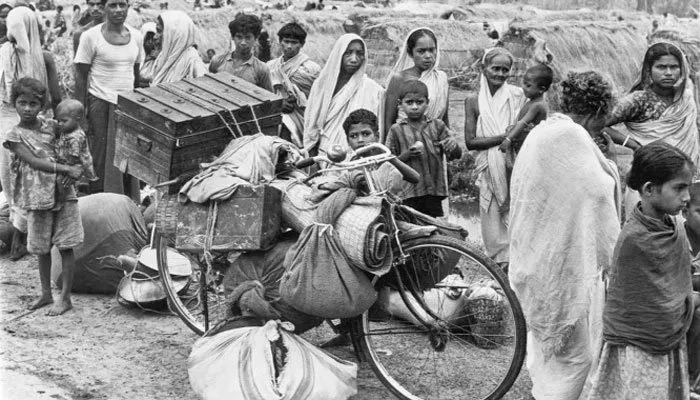Bangladesh : The liberation war

The struggle for Bengali rights started shortly after Pakistan gained independence as a country with two incontiguous territories known as West Pakistan (today’s Pakistan) and East Pakistan (today’s Bangladesh). The refusal to accept Bengali as a state language of Pakistan in the early years after Partition, economic disparity between the two parts, the hegemony of the West Pakistani ruling elite over Pakistan, martial laws, and a demeaning attitude towards Bengali culture and the Bengali population soured relations between the two parts.
Tensions rose in December 1970 when the Awami League party, led by Sheikh Mujibur Rahman (also known as Mujib) and based in East Pakistan, won the national elections but West Pakistan parties, namely the Pakistan Peoples Party (PPP), refused to hand over power. Tensions between Bengalis and Biharis – the Urdu-speaking communities that had moved to East Pakistan from different parts of India after Partition and who were seen as pro-West Pakistan – rose, which led to attacks on some Bihari communities.
In March 1971, using the violence as an excuse, the Pakistan Army intervened to stem the growth of nationalist sentiments in the east. It recruited local pro-Pakistan Bengalis and non-Bengalis, including members of the Islamic organisation Jamaat-e-Islami for its operations against Bengali factions. As the violence escalated throughout the summer, a large number of refugees streamed into Indian territory, which New Delhi used as an excuse to intervene militarily in early December 1971.
The nine-month conflict ended with the surrender of the Pakistani army on December 16; the death toll is estimated to have been between 300,000 and 3 million people, with hundreds of thousands of women raped.
Since the end of the war, various forces have tried to control the narrative in Bangladesh, most notably the Awami League – which came to be perceived as “pro-Indian” – and the Bangladesh military and Bangladesh National Party (BNP) – which has been deemed “pro-Pakistan” and “pro-Islamist”. This has hurt the process of transitional justice and frustrated many victims and their families for decades.
Having played an important role during the war, Mujib took power after independence. He banned Jamaat-e-Islami and introduced special laws that allowed for the arrest and prosecution of those accused of “collaborating” with the Pakistan military.
After Mujib’s assassination in 1975, General Ziaur Rahman seized power and started to change the public narrative on the liberation war. He made efforts to showcase the role various military actors played in the conflict and pushed to the background the role of the civilians. He also released the suspected war criminals and lifted the ban on Jamaat-e-Islami. In the following years, his party, the BNP, put some of its members accused of war crimes in influential positions, leaving victims increasingly troubled.
In the early 1990s, a group of civil society actors created the Committee for Eradicating the Killers and Collaborators of 1971, which held mock trials against suspected war criminals. Even though it had no legal legitimacy, the committee put pressure on the BNP government, which filed sedition charges against the organisers.
Sheikh Hasina, Mujib’s daughter who took over the leadership of the Awami League in the 1980s, used the momentum the committee created in her struggle for power against the BNP. She sought to recast what happened in 1971 as a struggle led solely by the Awami League.
During her 2008 election campaign, Sheikh Hasina also sought to appropriate the transitional justice process, promising to bring war criminals to justice by setting up a tribunal. The war crimes trials launched, however, have been marred by controversy. Some critics have alleged that Sheikh Hasina is using them to punish opponents and keep them out of power. There is concern that the politicised nature of the trials may render justice, which many survivors ache for, increasingly elusive.
Today, Sheikh Hasina has managed to solidify her narrative of the 1971 war to such an extent that, if one criticises her party, they are seen as criticising liberation itself, and therefore perceived as anti-state.
Meanwhile, the Bihari community who became stateless after the war until a 2008 Supreme Court judgement extended citizenship rights to them are concerned that those accused of attacking, killing and raping members of their community will never be brought to justice. This is because in official memory, as institutionalised by the Bangladeshi state, only crimes against Bengalis are remembered.
Today, thousands of Biharis continue to reside in camps. They live in marginalised conditions, labelled as “stranded Pakistanis” and pro-Pakistan collaborators for their alleged role in the war.